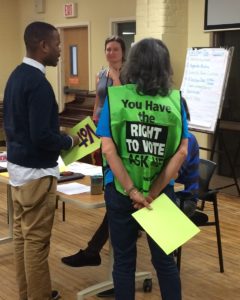This coalition is helping marginalized populations make it to the polls
 November 7, 2016
Category: Feature, Featured, Medium, Method
November 7, 2016
Category: Feature, Featured, Medium, Method
With rumors looming of planned voter suppression and intimidation on Election Day, many Philadelphians are anxious about casting their ballots. But for people who are homeless, formerly incarcerated or disabled, voting can routinely be a laborious process.
That’s why Vote for Homes, a nonpartisan coalition that advocates for these marginalized groups, is training volunteers to assist and help transport registered voters to the polls on Tuesday. All trainings have taken place at homeless services nonprofit Project HOME, the fiscal sponsor of the coalition.
“Not all eligible voters, including poll workers, are fully aware of all of Pennsylvania’s voting rules,” said Project HOME’s director of advocacy and public policy, Jennine Miller. “And so it is our job to help voters when needed and inform them of their rights.”
"Not all eligible voters, including poll workers, are fully aware of all of Pennsylvania’s voting rules."
The coalition, which started in 1999 as a small group of advocates, currently includes 50 member organizations and a robust network of individual volunteers. During the last general election in 2012, an estimated 100 people volunteered for Vote For Homes throughout Election Day, driving 131 voters to their polling sites and visiting 304 residences.
“My wife and I helped get out the vote with Vote For Homes during the 2012 election,” said one volunteer at a recent training. “We were only signed up to work 9 a.m. to 4 p.m., but we ended up volunteering until the polls closed because we got so into it.”
According to Project HOME Community Education and Engagement Specialist Heather Bargeron, who co-led trainings with Miller, people from underprivileged populations are turned away or given a hard time when they go to vote for a variety of reasons. Some of these include only owning certain forms of ID or residing in temporary housing, neither of which automatically disqualifies someone from being able to vote in Pennsylvania.
There was even one year, according to Miller, where a Project HOME client had to file a complaint at City Hall before he was granted permission to cast his ballot.
“The poll worker was insistent that our client could not vote because he lived in a shelter,” said Miller. “After stating his case at City Hall that same night, though, he was finally allowed to vote via provisional ballot.”
With the intent of bypassing these situations, voter assistants — to be clad in neon green jackets on Election Day — are trained to answer questions about voting rights, advocate for voters if they need assistance and serve as politically unbiased resources should a misunderstanding arise between voter and poll worker. Each training session included a thorough review of what’s on Pennsylvania’s ballot, a series of true or false questions regarding voting rights, and time to role-play hypothetical situations among voters, voter assistants and poll workers.
Much of each session served to dispel common voting misconceptions, such as the idea that voters cannot be assisted while voting.
“Even if you didn’t check off ‘needs assistance’ when you registered to vote, you are legally allowed to fill out a form at the polling site — which all polling sites have — for receiving assistance,” said Miller. “The only people who can’t help you are the Judge of Elections, your union representative and your employer.”
Since its inception, Vote For Homes has registered over 16,000 voters and mobilized many others. And, since Project HOME has long acted as the coalition’s unofficial headquarters, many volunteers are individuals who have experienced the two groups’ services firsthand.
“I signed up to volunteer with Vote for Homes this year because I wanted to help people like me be able to vote,” said Alfonso, who has lived in a Project HOME residence for two years. “Without Project HOME, I have no idea where I’d be today.”
Trending News










